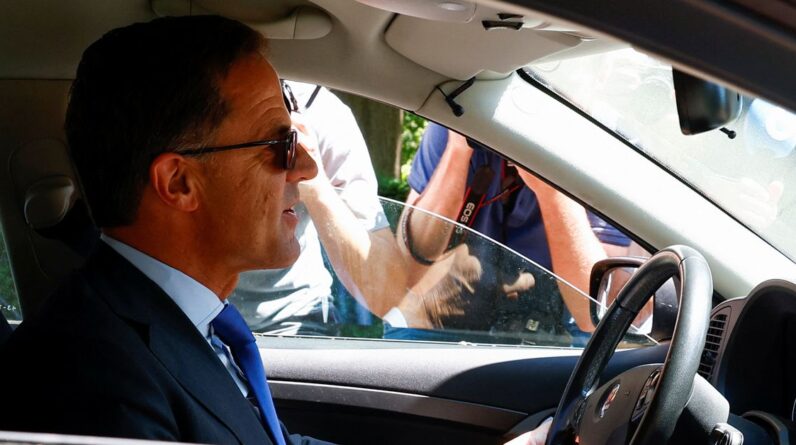
[1/4]Dutch Prime Minister Rutte arrives at Huis ten Bosch Palace to meet with Dutch King Willem-Alexander in The Hague, Netherlands July 8, 2023. REUTERS/Piroschka van de Wouw
THE HAGUE, July 8 (Reuters) – Dutch Prime Minister Mark Rutte met King Willem-Alexander on Saturday to discuss a caretaker administration, a day after his centre-right government collapsed after a dispute over migration policies.
Rutte declined to comment on the hour-and-a-half talks after leaving the palace in The Hague.
“These are confidential meetings,” he told reporters.
The next big step will be to dissolve parliament, but first there will be a government resignation debate in the Dutch lower house scheduled for Monday.
After the dissolution of parliament, elections will be held, scheduled for November.
Rutte, 56, in power since 2010, is the longest-serving Dutch prime minister. He said at a news conference on Friday that he would like to run for a fifth term, but would consult with his party before making a final decision.
The crisis in Dutch politics came after Rutte’s conservative VVD party tried to limit the flow of asylum seekers to the Netherlands.
Tensions came to a head this week when Rutte demanded support for a proposal to limit the arrival of children of war refugees already in the Netherlands and make families wait at least two years before being able to reunite yes
This was opposed by the small Christian Union and the liberal D66, which eventually brought down the government.
As head of state, the king is expected to ask Rutte’s coalition to stay on as a caretaker government until a new administration is formed after the election, a process that in the fractured Dutch political landscape usually takes months .
Before meeting the king, Rutte tweeted that he had called Ukrainian President Volodymyr Zelenskiy to make sure his government’s caretaker status would not affect Dutch support for Ukraine.
Not since the migration crisis of 2015-2016 has immigration been such a major flaw in European politics.
Support for Germany’s far-right AfD has surged in the past six months. And in Spain, polls suggest that the far-right Vox party could enter government after this month’s elections.
In the Netherlands, the migration is somewhat overshadowed by farmers’ protests against government plans to limit nitrogen emissions, which they say will mean the end of many farms.
The farmers’ protest party BBB became the largest party in the provincial elections in March.
In the latest Ipsos poll, conducted a week before the government collapsed, Rutte’s VVD was expected to remain the largest party in the 150-seat parliament with 28 seats. But BBB was predicted to increase from a single seat now to 23, making it the second largest.
BBB also supports stricter immigration policy and has suggested a possible annual cap of 15,000 asylum seekers.
The Netherlands already has one of the toughest immigration policies in Europe. Still, asylum applications rose by a third last year to more than 46,000, and the government has predicted they could top 70,000 this year, up from the previous peak in 2015.
Reporting by Stephanie van den Berg and Piroschka van de Wou; Editing by Ros Russell and Mark Potter
Our standards: The Thomson Reuters Trust Principles.
[ad_2]
Source link





